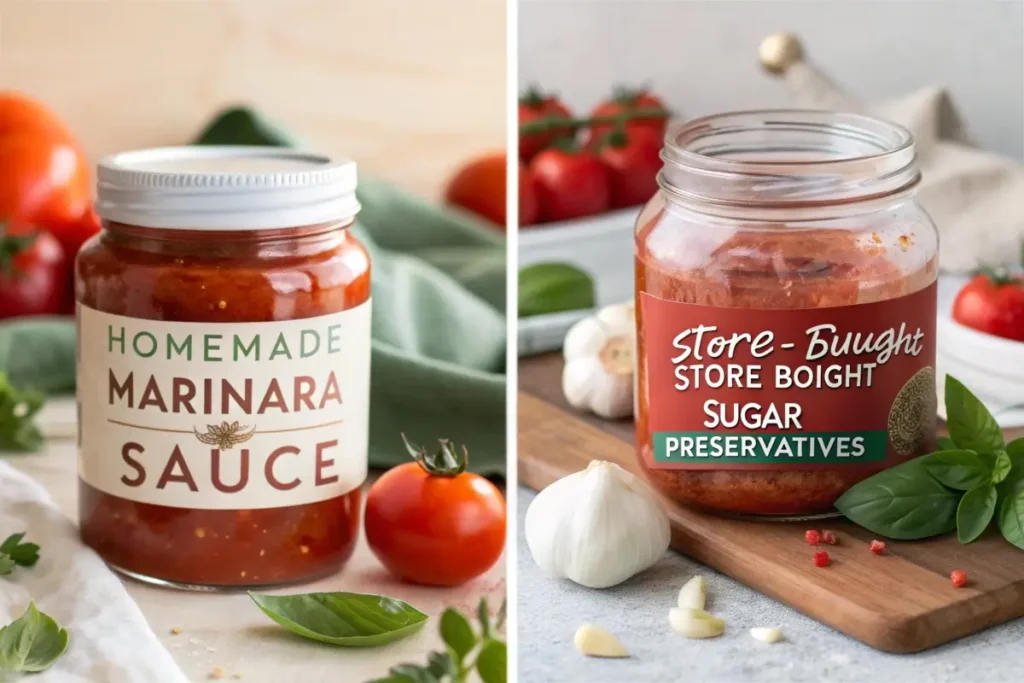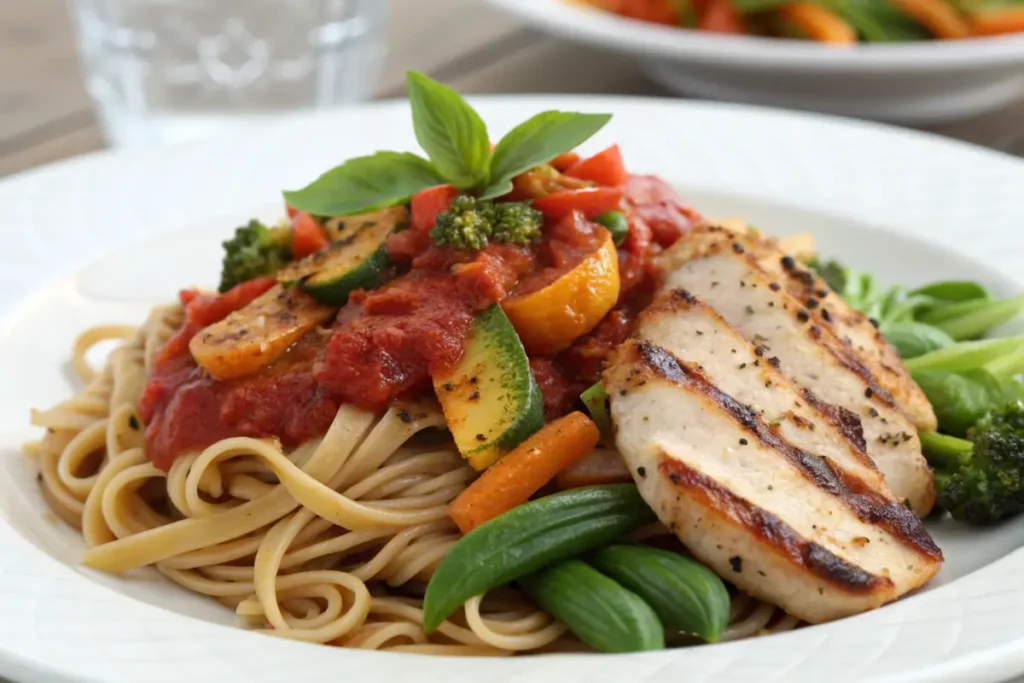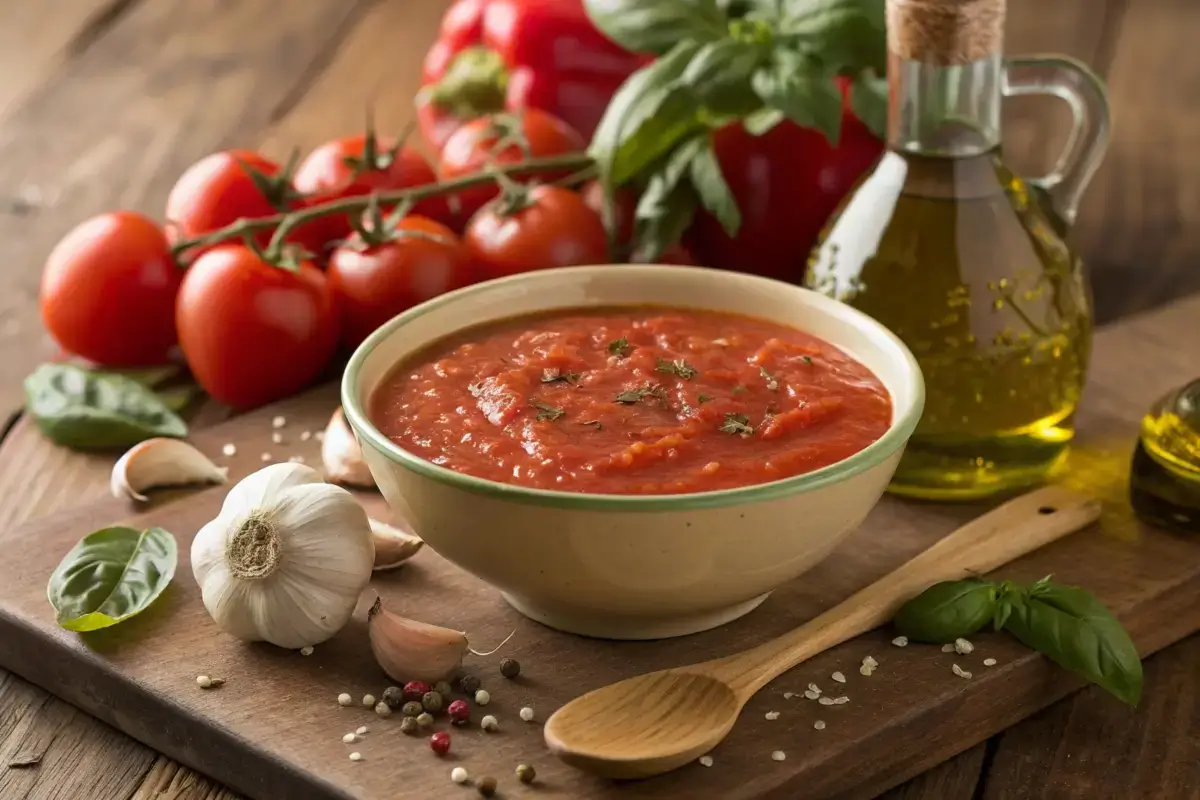Marinara sauce is more than just a delightful companion to your favorite pasta dishes—it’s a powerhouse of nutrition, bursting with essential vitamins, antioxidants, and low-calorie goodness. This article dives deep into the question: how is marinara sauce healthy? From its rich blend of nutrients to tips on making it even healthier, you’ll discover everything you need to know about this beloved Italian staple. Let’s start with an overview of what makes marinara sauce so special.
Introduction to Marinara Sauce and Its Popularity
What is marinara sauce?
Marinara sauce is a classic tomato-based sauce rooted in Italian cuisine. Known for its bold flavors and versatility, it’s typically made with simple, wholesome ingredients like ripe tomatoes, garlic, onions, and a mix of aromatic herbs such as basil and oregano. Its vibrant red hue and zesty taste make it a popular choice for pasta, pizza, and dipping sauces worldwide.
Why is it a staple in Italian cuisine?
Italian cuisine embraces simplicity and freshness, and marinara sauce epitomizes these qualities. Italians value the sauce for its ability to enhance dishes without overpowering them, allowing the natural flavors of the tomatoes and herbs to shine. Moreover, its quick preparation time makes it a go-to for home cooks and chefs alike, embodying the Italian philosophy of delicious meals made simple.
Overview of its health perception
Despite being a flavorful indulgence, marinara sauce is also a nutritional gem. It’s lauded for being low in calories and rich in antioxidants, particularly lycopene—a compound linked to numerous health benefits, including improved heart health and reduced cancer risk. However, not all marinara sauces are created equal, as store-bought varieties may include added sugars and preservatives. This article explores how you can make the most of marinara’s natural health benefits while avoiding potential pitfalls.
Nutritional Benefits of Marinara Sauce
Rich in vitamins and minerals
Marinara sauce is a nutritional dynamo, packing an array of essential vitamins and minerals into every serving. Tomatoes, the primary ingredient, are brimming with vitamin C, a powerful antioxidant that boosts your immune system and promotes skin health. Additionally, marinara provides vitamin A, which supports vision, and potassium, an essential mineral for maintaining balanced blood pressure. Together, these nutrients make marinara sauce a surprisingly healthy addition to meals.
Lycopene and its antioxidant properties
One of the most celebrated aspects of marinara sauce is its high lycopene content. Lycopene is a potent antioxidant that gives tomatoes their signature red color and offers several health benefits. Research suggests it can help reduce the risk of heart disease and some cancers. Moreover, cooking tomatoes enhances lycopene’s bioavailability, meaning that marinara sauce may deliver more of this nutrient than raw tomatoes alone.
Low calorie and low-fat content
Another reason to love marinara sauce is that it’s naturally low in calories and fat. This makes it an ideal choice for those looking to maintain or lose weight. A typical serving contains fewer than 100 calories, allowing you to indulge in flavorful dishes without guilt. Opting for a homemade or low-sodium variety ensures you reap these benefits while avoiding hidden sugars and unhealthy fats.
Comparing Marinara Sauce to Other Pasta Sauces
Nutritional differences: Marinara vs. Alfredo
When it comes to pasta sauces, marinara often outshines its cream-based competitors like Alfredo sauce. Unlike Alfredo, which is laden with heavy cream and cheese, marinara sauce relies on wholesome, plant-based ingredients. This makes it significantly lower in saturated fats and calories, making it a heart-healthier option.
Healthier choice: Sugar and sodium content comparison
Store-bought pasta sauces can be tricky, as many contain added sugars and high levels of sodium. Marinara sauce typically has less added sugar than alternatives like barbecue or sweetened tomato sauces. However, reading labels is crucial to ensure you’re selecting a brand that stays true to marinara’s naturally low-sugar, low-sodium profile.
Why marinara stands out as a better option
With its combination of nutritional benefits and rich, tangy flavor, marinara sauce stands out as a top pick for health-conscious eaters. It delivers a boost of antioxidants, vitamins, and minerals without the excessive calories or fats found in many other sauces. Whether paired with whole-grain pasta or used as a topping for lean proteins, marinara sauce helps you enjoy flavorful meals while supporting overall well-being.
Potential Health Risks of Marinara Sauce

Excess sodium and its implications
While marinara sauce is undoubtedly nutritious, it’s essential to watch out for its sodium content, especially in store-bought versions. Many brands rely on salt to enhance flavor, which can lead to high sodium levels. Consuming too much sodium can contribute to high blood pressure and increase the risk of heart disease. To mitigate this, opt for low-sodium marinara sauces or make your own to control the salt content.
Added sugars in store-bought versions
Another hidden concern with pre-packaged marinara sauces is the inclusion of added sugars. Manufacturers often use sugar to balance the sauce’s natural acidity, but this can turn a healthy option into a less desirable one. High sugar consumption is linked to weight gain, tooth decay, and metabolic issues. To keep things healthy, always check ingredient labels and look for sauces that list no sugar or sweeteners.
Artificial preservatives and health concerns
Artificial preservatives like sodium benzoate or potassium sorbate are sometimes added to extend shelf life, but these can raise red flags for health-conscious eaters. Although considered safe in small amounts, overconsumption of such additives may carry long-term risks, including allergies or gastrointestinal discomfort. Homemade marinara or organic, preservative-free options are the safest bets to enjoy a pure, healthful sauce.
Healthy Preparation Tips for Marinara Sauce
Making marinara sauce at home
Making your own marinara sauce is one of the best ways to maximize its health benefits. By using fresh, nutrient-rich ingredients like ripe tomatoes, garlic, and basil, you can create a flavorful, preservative-free sauce. Start by sautéing garlic in olive oil, adding crushed tomatoes, and seasoning with herbs like oregano and thyme. Simmer until thickened, and you’ve got a wholesome marinara ready to enjoy.
Choosing healthier store-bought options
If you’re short on time, don’t worry—there are plenty of healthy store-bought marinara sauces available. Look for brands that use minimal ingredients and avoid added sugars, excessive salt, or artificial preservatives. Organic marinara sauces are often a good choice since they prioritize quality ingredients.
For more ideas on incorporating wholesome meals into your diet, check out the Easy Healthy Dinner Recipes for quick and nutritious options.
Incorporating nutrient-dense ingredients
To make marinara sauce even healthier, consider adding extra ingredients that pack a nutritional punch. Diced carrots, spinach, or red peppers can boost the vitamin content, while a splash of olive oil adds heart-healthy fats. You can also toss in lentils or lean ground turkey to create a hearty, protein-rich sauce that pairs beautifully with whole-grain pasta or zucchini noodles.
How to Balance Marinara Sauce in a Healthy Diet

Portion control and balanced meals
Even though marinara sauce is nutritious, portion control is essential to maintain its health benefits. Overloading your plate with sauce can increase calorie and sodium intake, especially if paired with less healthy foods like white pasta or heavy cheeses. Instead, stick to a serving size of around half a cup and balance your meal with plenty of vegetables, lean proteins, and whole grains. This ensures you enjoy the sauce’s flavor while keeping your meal light and healthful.
Combining marinara sauce with whole grains
Pairing marinara sauce with whole-grain options, such as brown rice pasta or quinoa, is a simple way to create a more balanced dish. Whole grains are high in fiber, which aids digestion and helps regulate blood sugar levels. This combination makes for a hearty, filling meal that supports long-term health. Swapping traditional pasta for zucchini noodles or spaghetti squash is another excellent way to cut down on carbs without sacrificing flavor.
Pairing with vegetables and lean proteins
Adding colorful vegetables like spinach, zucchini, or bell peppers to your marinara-based dishes boosts their nutrient profile. For an extra protein punch, pair the sauce with grilled chicken, shrimp, or tofu. These additions not only enhance the taste but also create a well-rounded meal that aligns perfectly with a balanced diet. By combining marinara with wholesome ingredients, you can truly answer the question, how is marinara sauce healthy?
FAQs: Common Questions About Marinara Sauce
Is marinara sauce better than tomato sauce?
Yes, marinara sauce often comes out on top because it’s typically made with fewer ingredients and contains no cream or added oils, making it lower in calories and fat. However, the specific nutritional value depends on the recipe or brand. Reading labels is key to finding a healthier option.
Can marinara sauce help with weight loss?
Absolutely! Marinara sauce is low in calories and can fit well into a weight-loss plan, especially when paired with whole grains and vegetables. Its rich flavor satisfies taste buds without adding excessive fats or sugars, making it an excellent addition to weight-conscious meals.
What makes marinara sauce a good source of antioxidants?
Marinara sauce is packed with lycopene, a powerful antioxidant found in cooked tomatoes. This nutrient helps combat oxidative stress and supports overall health. The cooking process enhances lycopene’s availability, making marinara an ideal choice for reaping these benefits.
How to identify healthy marinara sauces in stores?
To choose a healthy marinara sauce, check the ingredient list for simple, natural components. Avoid sauces with added sugars, artificial preservatives, or high sodium levels. Opt for organic or low-sodium options whenever possible.
Conclusion: Is Marinara Sauce Good for You?
Summary of benefits and risks
Marinara sauce is undeniably a healthy choice when incorporated into a balanced diet. Its low calorie, low-fat profile and high levels of antioxidants like lycopene make it a flavorful way to boost your nutrient intake. However, as with any food, moderation is key. Being mindful of sodium and sugar content, particularly in store-bought versions, is crucial to fully enjoy its benefits without compromising your health. So, how is marinara sauce healthy? It’s a combination of natural ingredients, rich nutrients, and adaptability to various diets that makes it a standout.
Encouragement to include it in a balanced diet
By pairing marinara sauce with whole grains, fresh vegetables, and lean proteins, you can elevate its nutritional value while keeping meals satisfying and flavorful. Whether you’re enjoying a classic spaghetti dinner or a creative zucchini noodle dish, marinara sauce can fit seamlessly into your healthy eating routine. Opt for homemade or carefully chosen store-bought versions to get the most out of this versatile Italian staple.
FAQs: Common Questions About Marinara Sauce
Can marinara sauce be part of a weight-loss diet?
Absolutely! With its low-calorie profile and bold flavor, marinara sauce is a smart addition to weight-loss meals. It pairs well with lighter ingredients like zucchini noodles or lean proteins, helping you stay on track without sacrificing taste.
Is homemade marinara sauce healthier than store-bought?
Yes, homemade marinara sauce gives you complete control over ingredients, ensuring no added sugars or preservatives. Store-bought options can be healthy too, but it’s essential to read labels carefully to avoid hidden additives.
What makes marinara sauce a superfood for heart health?
The lycopene in tomatoes, enhanced through cooking in marinara sauce, plays a significant role in reducing inflammation and improving heart health. Combined with its low-fat nature, marinara sauce is a heart-friendly choice.
How is marinara sauce healthy compared to cream-based sauces?
Unlike cream-based sauces, marinara sauce contains no heavy creams or cheeses, making it much lower in saturated fats. This makes it a healthier option for those watching their calorie and fat intake.

